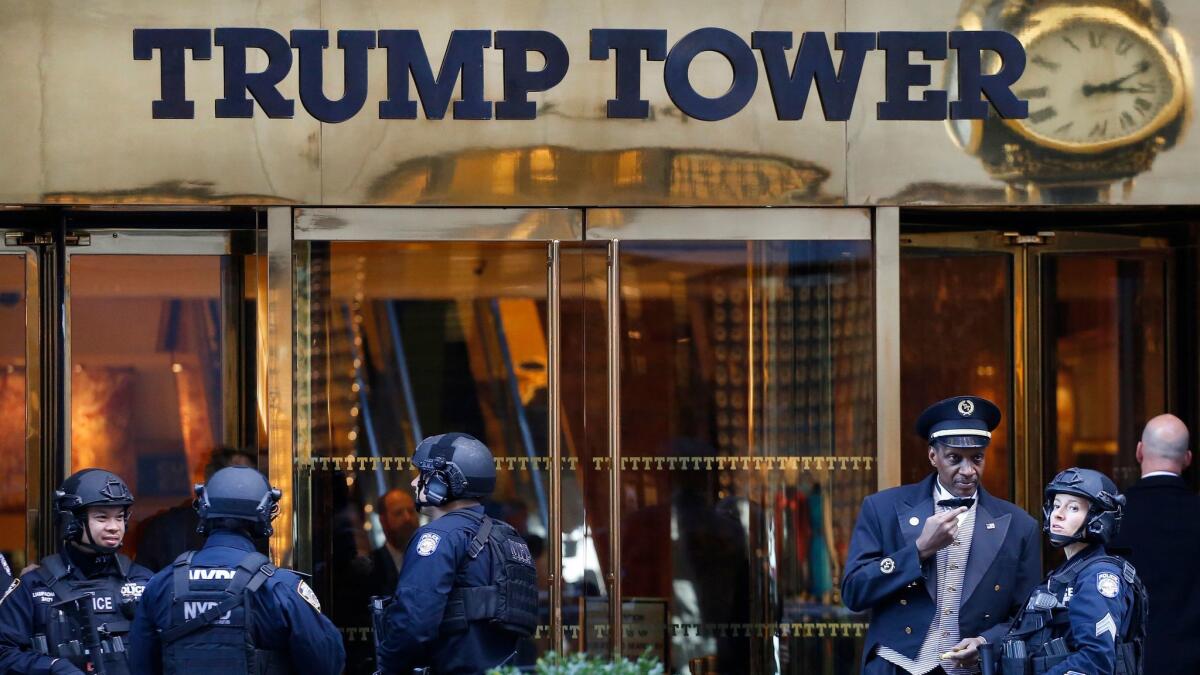Op-Ed: Let the emoluments case against Trump go forward

A legal team made up of constitutional scholars has filed a lawsuit in federal court in New York alleging that President Trump is violating the emoluments clause of the Constitution, which prohibits the president from receiving payments and gifts from foreign countries. The plaintiff, Citizens for Responsibility and Ethics in Washington — CREW — is a nonprofit, nonpartisan organization that works on behalf of the public to foster ethics in government and reduce the influence of money in politics. This lawsuit is the first legal challenge to Trump’s decision to be both president and de facto CEO of a billion-dollar empire whose numerous companies do business with many nations. It is vitally important that this lawsuit be allowed to go forward.
Before the court in New York can address whether the president is violating the Constitution, however, it has to determine whether Citizens for Responsibility and Ethics has legal standing to bring this complaint. Every plaintiff in federal court must be able to show a personal injury caused by the defendant that can be redressed by a court. These requirements for standing, the Supreme Court has said, are required by Article III of the Constitution and cannot be waived by the defendant or by the court.
Exactly what defines a proper plaintiff isn’t crystal clear, and soft or intangible factors often affect standing decisions, especially in highly politicized cases. Eric Posner, a leading constitutional scholar at the University of Chicago, recently characterized standing as the world’s “spongiest” legal doctrine. He is correct.
Never before have the people of the United States elected a President with business interests as vast, complicated, and secret as those of Donald J. Trump.
CREW claims that its legal injury is that it “has been forced to divert essential and limited resources — including time and money — from other important matters … to the Foreign Emoluments Clause issues involving Defendant, which have consumed the attention of the public and the media,” and that it will need to continue to do so until a court remedies the president’s alleged constitutional violations.
The lawsuit relies on the 1982 Supreme Court case Havens Realty Corp. vs. Coleman, which granted standing in similar circumstances to a public-interest group devoted to fair housing issues. Numerous scholars are arguing, however, that the two cases are significantly different and, in any event, Havens Reality is old, discredited law.
That technical legal debate, however, is unlikely to be the deciding factor in whether this core challenge to Trump’s authority is allowed to go forward. There are many examples of plaintiffs in high-profile and important cases having their cases heard despite injuries just as or even more abstract and tenuous than the ones put forward by CREW.
Abigail Fisher, a white student denied entrance to the University of Texas, was allowed to challenge the affirmative action policies of the university even after she had graduated from another college and admitted she would never again apply to UT. Massachusetts was allowed to sue the Environmental Protection Agency over its failure to issue certain regulations based on the highly speculative claim that the coastline of that state might in the future be damaged by global warming. Environmental groups were allowed to challenge federal limitations on nuclear-power-company liability even though no accident had occurred and the plant in question hadn’t been built yet.
In all three of these cases, the plaintiffs’ claims of injury were flimsy at best but the Supreme Court decided that the public interest required that the cases be heard.
CREW’s complaint alleges that “never before have the people of the United States elected a President with business interests as vast, complicated, and secret as those of Donald J. Trump. Now that he has been sworn into office as the 45th President of the United States, those business interests are creating countless conflicts of interest, as well as unprecedented influence by foreign governments, and have resulted and will further result in numerous violations of Article I, Section 9, Clause 8 [ the emoluments clause] of the United States Constitution.”
This lawsuit presents important, fundamental and time-sensitive issues of national public policy that should be resolved by the courts of the United States. A judge, or judges, willing to do so can easily find the law necessary to justify hearing this case, and the national interest requires exactly that result.
Eric J. Segall, a law professor at Georgia State University, is the author of “Supreme Myths: Why the Supreme Court Is Not a Court and Its Justices Are Not Judges.”
Follow the Opinion section on Twitter @latimesopinion and Facebook
More to Read
A cure for the common opinion
Get thought-provoking perspectives with our weekly newsletter.
You may occasionally receive promotional content from the Los Angeles Times.






